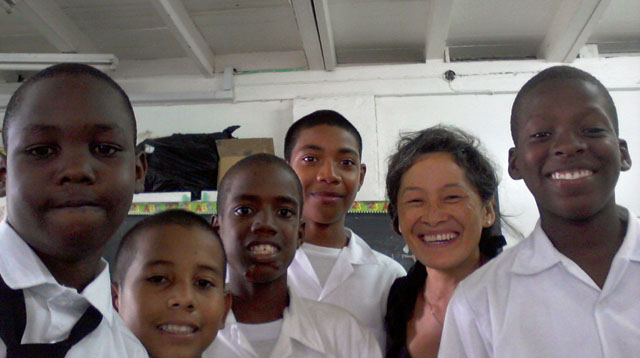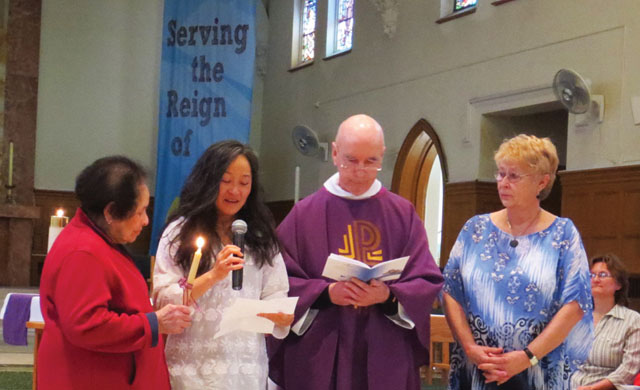Experiencing God’s love in mission
A new missioner discovers the beauty and warmth of Guyana and its peoples
By Donna Joy Tai
September/October 2013
Return to Table of Contents
Print Article
Dear land of Guyana, of rivers and plains,
Made rich by the sunshine, and lush by the rains,
Set gem-like and fair, between mountains and sea,
Your children salute you, dear land of the free.
The first verse of the national anthem of Guyana describes the geography of this young Commonwealth nation that only gained independence from Britain in 1966. As our plane approached the Cheddi Jagan International Airport, I could see acres and acres of verdant green, striped with rivers and tributaries and dotted with small settlements.
 Donna Joy Tai with some of her Bosco boys from the St. John Bosco Orphanage and Bosco Academy where she teaches Spanish and assists with after school reading.
Donna Joy Tai with some of her Bosco boys from the St. John Bosco Orphanage and Bosco Academy where she teaches Spanish and assists with after school reading.
Guiana is an Amerindian name meaning “land of many waters,” and the country benefits from 16 major river systems. Only about 25% of Guyana is settled, mostly in small villages along the rivers and coastline, with the largest concentration in Georgetown, the capital, with just over 250,000 people, representing one third of the total population.
Although located on the South American continent, sandwiched between Venezuela to the west, and Brazil to the east and south, Guyana identifies more with its Caribbean neighbours with a similar colonial, socio-political and economic history, and is a member of the Caribbean Community (CARICOM). Unlike the islands, however, Guyana cannot boast of white beaches and clear blue water, but rather sports muddy brown coastline because it is below sea-level. In fact, if not for a Dutch-engineered seawall with a system of trenches and dykes, and the cultivation of mangroves, the entire coastal area could be flooded at each high tide. Even the rivers have black “Coca-Cola” water.
Guyana is the only English-speaking country on the continent. The common language is a Creolese sister to the English dialects spoken on other Caribbean islands. My Jamaican heritage and upbringing helped me adapt quickly to the local lingo, especially useful at the market when buying balanjay (eggplant) and pawpaw (papaya), and ensuring I get off the bus at the proper stop: “nex kawnah deh”i> (the next street corner or intersection).
Rich in diversity
Guyana is a land of many heritages and creeds. Its colonial history includes the Spanish, French, Dutch, and British who encountered Aboriginal peoples— the Warrau, Arawak, and Carib. The era of slavery brought Africans, and post-slavery brought East Indians, Chinese, and Portuguese from the island of Madeira as indentured workers to replace the emancipated African slaves. With these peoples came their various languages and religious practices—Christian/Catholic, Hindu, Muslim, Buddhist—to add to the Aboriginal traditions. Mandirs (Hindu temples), Christian churches of all denominations, and a growing number of mosques are present in all villages and towns.
Guyana is proud of its six-nation heritage: African, East Indian, Chinese, Portuguese, other European (mainly British, Dutch, French) and Amerindian—with some people having all six in their family tree. Freedom of religion is an intrinsic right of Guyanese society, with interfaith unions more the norm than the exception. The biggest social divide exists between the rich and the poor.
In search of ministry
As a new foreign missioner in search of ministry, I began volunteering my time at St. John Bosco Orphanage, home to 51 boys aged five to 16. I assist some of them after school with reading and have also begun teaching basic Spanish to the Grade Six boys one morning a week at the adjoining Bosco Academy. Two mornings a week I visit seniors at The Palms Geriatric Centre and St. Joseph Mercy Hospital hospice. And every other Saturday for a few weeks I went to the village of Unity to assist the priest in preparing young people for confirmation. Variety is the spice of life and sometimes of mission as well.
The Bosco boys won my heart from the first with their eager and enthusiastic welcome. They see a parade of volunteers, some for a few weeks, some for a few months, and each boy tries to become the favourite during that limited time, to be showered with attention, affection, and gifts.
Most of the boys, if not all, come from traumatic home environments with little or no parental guidance and without good role models; some have physical or intellectual challenges. Building relationships is difficult. After sharing some of my frustrations with my fellow missioner, she declared what I was already concluding: “Just love them!”
Whatever the challenges, they each have their own unique gifts and talents, which I hope to help each boy discover and nurture. A local charitable foundation funds music lessons, especially for steel pan. The best students join the Bosco Steel Orchestra and perform at public and private events. Several boys demonstrate true artistic talent, others excel in football and table tennis, while many enjoy the national sport of cricket. Some have expressed big dreams—whether to own or live in one of the mansions they see around them, or to find cures for diseases, or to help bring about world peace. Children are the future of our world and need guidance, encouragement, love, and opportunity. For the Bosco boys, I pray that I will be a positive way station on their life journey.
Just as the boys are in need of attention, so too the seniors, many with family who are physically or emotionally distant. At the Palms, the residents look forward to our visit, sharing candy, Scripture, and hymns. One man plays his harmonica while some of the women go into impressive harmonies. The Spirit is truly at work in the sharing of God’s praise and worship among Christians and non-Christians alike. We all feel the love during these weekly encounters.
At the St. Joseph Mercy Hospital hospice, I share and discuss Scripture readings and sing hymns, with clapping and sometimes dancing. I witness once again the movement of the Spirit in the presence and participation of these women, despite their various ailments. I am very grateful for this ministry that allows me to share my love of music and singing, honed by many years as a parish music minister.
After only four months, I am still discovering the beauty and the gifts of Guyana and its people, while discovering my own gifts as a missioner in service to them. There have been and will be moments of discouragement, but there are many more moments each day which feed my enthusiasm: rainbows reflected in rain puddles; the cacophony of migrating wild parrots at dawn followed by the soothing and joyful twittering of songbirds; a graceful hawk gliding overhead; a flock of white ibises like sentinels in a freshly mown field; trenches filled with blossoming lotus flowers or water lilies; the smiling faces of curious children; succulent tropical fruits; the shimmering sound of rain on rooftops and the refreshing coolness that the rains bring; looking up at thousands of stars in the sky, now visible because of a blackout; the flickering lights of fireflies at night; random acts of kindness by strangers; and limin’ (hanging out) and gaffin’ (chatting).
As their anthem says, “Your children salute you” Guyana, and so do I.
At her missioning ceremony on March 16, 2013, Donna Tai made her one year commitment as a Scarboro missioner. Photo left: Donna with her mother, Fr. Brian Swords and lay missioner Mary Olenick. In her statement, Donna said:
“With joy and gratitude for the many blessings of God and for the working of the Holy Spirit in my life, I stand before God, my Scarboro family, and my family and friends. In this sacred place I commit to one year of service as a Scarboro missioner, to walk in solidarity with the peoples of Guyana and to share in their struggles and aspirations. I trust in the guidance of the Holy Spirit to make use of my gifts and talents where they are most needed. With your prayers and support, may I succeed in showing and bringing forth among the Guyanese people the fruits of the Spirit: “love, joy, peace, patience, kindness, generosity, faithfulness, gentleness and self-control.” (Galatians 5:22)
Return to Table of Contents
Print Article
